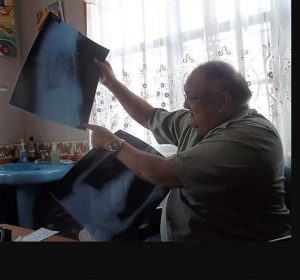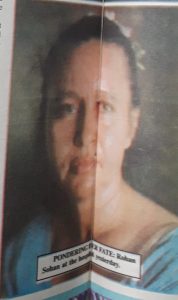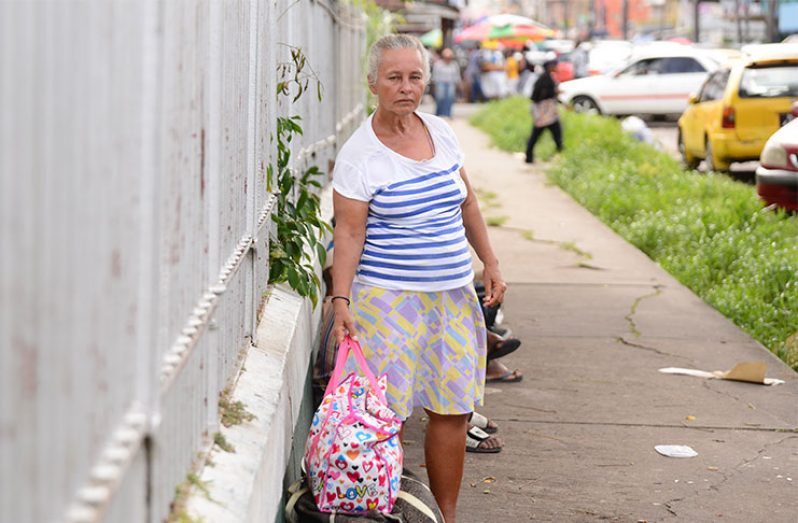IN March 2000, Romona Barak-Oada, also known as Romona Soman, made local and international news when it was discovered that for 10 years, she been walking around with forceps –scissors used in surgery- in her stomach.
The instrument, according to reports, was accidentally left there in 1990 when Romona had to undergo emergency surgery, after bandits had invaded their family home at New Market Street, in the city, and stabbed her numerous times.
But life for the now 58-year-old Romona, who had subsequently moved to Huntley Village, Mahaicony, East Coast Demerara, is not a happy one.
The instrument has still not been removed from her stomach, and she is now homeless. Romona spends most of her daylight hours on the pavement outside of the Bourda Post Office, with her worldly belongings as she mingles with other pavement dwellers.

She also wants to be compensated for what she deems negligence by the medical practitioners, adding “I am not asking for much- just couple million- about $10M. I am not pressuring anyone [but] after all, is their fault.”
Just before nightfall, the woman said she would go to someplace she describes as a “safe house”, take a bath, change her clothes and grab a bite before taking a nap away from any form of harassment. As day breaks she hurries through a similar routine before heading down to what is now her “favourite hanging spot”, she added.
Romona said she became homeless after she left home one day to conduct business in the city and returned to find the house was broken into and her furniture and other belongings missing .
She said that she sought help from the police but they paid her no heed and subsequently, she realised that persons related to her husband began occupying the house. She was then forced to live at the Night Shelter.However, she moved after persons started going there to torment her.
Questioned by the Pepperpot Magazine about the whereabouts of her husband and four children, Romana’s answers were not consistent.
The Guyana Chronicle had in 2000, conducted several interviews with Romona and it was as a result of this that the publication was able to recognise her among the pavement dwellers recently.
Romona, who is coherent and usually attired, said during a recent interview that the 1990 incident caused her to be hospitalised and she noted that she remembers the subsequent discovery of the instrument as though it occurred yesterday.
She stated that when the bandits invaded her premises, they robbed her of a huge amount of money which represented payment for a house that her father had sold to a man who lived nearby. The attackers had used a knife and an icepick to stab her in the region of her heart.
She remembered that the surgery was performed by then Medical Superintendent of the Georgetown Public Hospital Corporation, Dr Innocent Muchenagumbo. The doctor who had already left the country by the time of the discovery of the instrument 10 years later.
Also, it was in January of 2000, following an assault by neighbours, that she had begun to feel pains in her head and later under her left breast. She had visited both public and private hospitals for relief before the cause of the pains was discovered. And, though efforts were made to have surgery done at either the public or a private hospitals to have the instrument removed, the local medical practitioners felt that a subsequent surgery could have been successfully done here, but Romona’s biggest problem then, was regaining confidence in the local doctors to perform another procedure on her.
“ I was fearful then and I am still fearful now of doing surgery in this country, why can’t they send me overseas?” she pleaded.
She claimed too, that after the discovery was made she made repeated visits to top government officials and others in the health sector for assistance for her to be sent overseas to have a surgery done, but she was scoffed at and insulted.
According to a March 12, 2000, Guyana Chronicle article, hospital officials initially examined Romona, who had complained of experiencing `excruciating pains in her stomach.’ The officials first thought she was pregnant, but a urine test proved negative. It was an x-ray grab that showed the medical instrument, measuring about six inches long, with tips pointing left and upwards, lodged about four inches below the woman’s heart.

The article had also reported that GPH Medical Superintendent, Dr Madan Rambarran and President of the Guyana Medical Association, Dr Max Hannoman, as saying that they could not recall any previous reports of such a case in Guyana. They, however, did not rule out that there may have been cases that had not been reported while noting that they knew of incidents where cotton swabs were mistakenly left inside the bodies of patients after surgery.
Rambarran had admitted then, that he was aware of a discussion between doctors and the patient to have the surgical instrument removed but he had learnt that the woman had refused, claiming that she was not having any problems.
He had said too, that the instrument had posed no immediate risk to the patient’s life, and had called on his peers to be more vigilant with swabs and instruments, especially when conducting open, abdominal surgery.
Then Health Minister Dr Henry Jeffery was reported as saying that he had been advised that it was possible for the surgery to be done here and had promised Romona that the hospital would have done whatever it could to have the instrument taken out.
Jeffery had said too, that officials at the hospital were concerned about the incident and the welfare of the patient while adding that the incident was “a lesson of which all medical practitioners should take note.”
A diligent search by the Pepperpot Magazine for any subsequent incidents in Guyana, stumbled upon a report by another media outlets of a 29-year-old mother of nine, of Ondeerneeming, Sand Pit, Essequibo Coast, who had to undergo a second surgical intervention at the Suddie Public Hospital, to remove a pair of surgical scissors left inside her for 10 days.
The article further stated that the woman, Alicia Benjamin, was on December 23, 2010, rushed to the Suddie Public Hospital, crying out for severe abdominal pains.
The woman’s husband had said that an emergency operation on his wife was performed, due to the severity of her persistent abdominal pains, which was caused by an ectopic pregnancy.
She spent one week in the hospital and was discharged, but three days after, the woman again started to cry out for severe abdominal pains and was vomiting profusely.
Alicia was taken back to the Suddie Public Hospital where the discovery was made after two ultrasound scans.
That doctor and another who was dispatched from the city performed another surgery and successfully removed the instrument.




.png)









